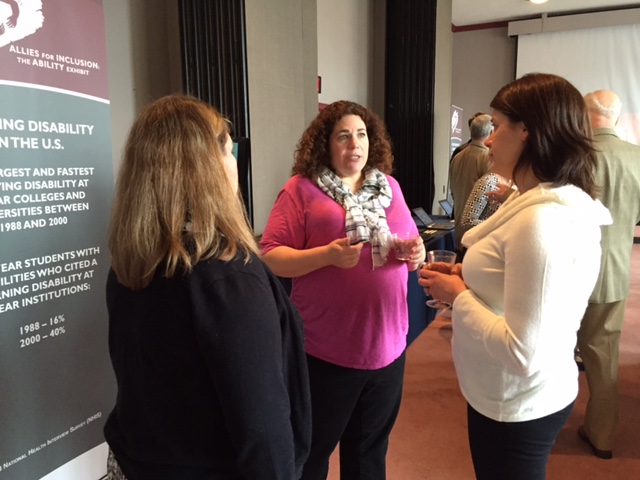Expanding the concept of access
Nearly 40 staff and faculty helped launch Lehigh’s observation of the 25th anniversary of the Americans with Disabilities Act, a law that prohibits discrimination against individuals with disabilities and has opened the doors of higher education to generations of students.
At a reception on April 7, University Provost Pat Farrell noted that more than 300 undergraduate and graduate students with a wide range of disabilities are now attending Lehigh.
“This celebration reflects our efforts to promote a more inclusive environment for all of our students and employees and ties into our Principles of Equity and Community,” Farrell said. “Ensuring accessibility is an ongoing process that everyone needs to be mindful of as we move forward.”
Farrell said that a university committee is dedicated to these issues, addressing everything from evolving technology to Lehigh’s challenging terrain.
“This week of celebration reminds us of what we’ve accomplished, and encourages us to reflect on what still needs to be done to be truly inclusive,” he said.
The reception was part of Lehigh’s weeklong celebration of the ADA, which was enacted by the U.S. Congress and signed into law by President George H.W. Bush on July 26, 1990. As part of the week’s activities, “Allies for Inclusion: The Ability Exhibit,” a traveling interactive display created by Saint Louis University, was on campus April 7, 8 and 9.
Wider access and emphasis
Farrell, and others who spoke at the reception, noted that the concept of “access for all” moves far beyond architectural and technological barriers, and includes attitudes about individuals with disabilities as well.
Carmen Twillie Ambar, president of Cedar Crest College and an attorney who represented plaintiffs and defendants in the early days of the ADA laws, said the emphasis has moved in the quarter of a century that the ADA existed.
“It’s not about ‘compliance,’ as it has become about access, about opportunity, about universal design,” Ambar said. “This shift isn’t about helping just a group of people, but changing the world for good, for the benefit of all of us. We are changing the world one student at a time. Every time we expand access and opportunity, we’re all the better for it.”
That sentiment was echoed by Elizabeth Mead, provost of Cedar Crest College, who said that her college and Lehigh share the same concerns about maintaining the aesthetic of a visually appealing campus dotted by well-preserved historic buildings.
At the same time, she said, “we have to understand that these are remnants of a time when only able-bodied young men had access to these buildings. We are challenged to think of ways to preserve that aesthetic while removing barriers, because it’s not just students with disabilities. It could be a staff member after a ski accident, or an alum visiting campus. It could be any one of us.”
Ultimately, she said, removing these barriers leads to access for many more, and enriches the daily experience for everyone on campus.
Challenging misconceptions
The ABILITY Exhibit challenges visitors to rethink their impressions of disabilities, spotlighting accomplished individuals who overcame disabilities such as dyslexia, amputation and progressively debilitating diseases such as Parkinson’s. It also notes the large percentage of Americans who deal with some form of disability—nearly one in five—and underscores the concept of access as a basic civil right.
Within the first few hours of opening on the third floor of the University Center, more than 50 members of the Lehigh community walked through the interactive exhibit, according to Jess Manno, director of planning and assessment for Student Affairs.
The goal of the exhibit and the three days of programming related to the ADA commemoration at Lehigh, is to encourage others to “treat people with disabilities as people first,” said Cheryl Ashcroft, director of Disability Support Services.
“They are people who happen to have a disability—they are so much more than a diagnosis,” she said.
Kathleen Hutnick, director of Graduate Student Life and a former assistant director of disability support services at Lehigh, said she learned a great deal from Ashcroft in the five years she worked with her.
“Aside from the fact that Cheryl is a national expert on these issues, she showed us how to work with students to harness all their abilities,” she said. “She is tremendously dedicated to our students and that dedication is key to the success so many of our students. With the help of Cheryl and her staff, those students can really make the most of their Lehigh experience.”
Posted on:


